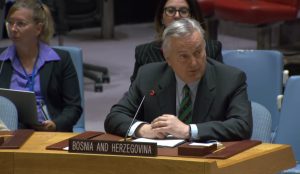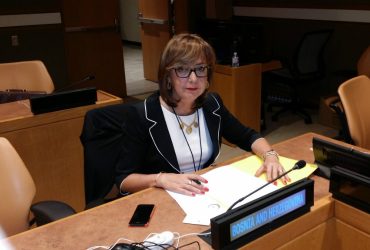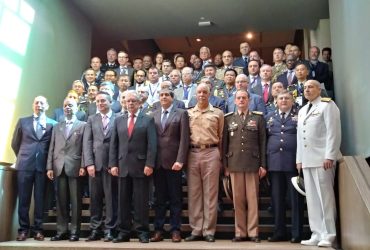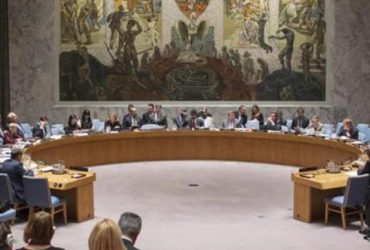Ambassador Lagumdžija at UN Security Council Calls for International Cooperation on AI Regulation
New York, April 4, 2025
 The Permanent Representative of Bosnia and Herzegovina to the United Nations, Dr. Zlatko Lagumdžija, participated today in a special meeting of the UN Security Council in Arria format, dedicated to the role of artificial intelligence (AI) in maintaining international peace and security. The meeting titled “Harnessing safe, inclusive and trustworthy artificial intelligence (AI) for the maintenance of international peace and security” was organized by Greece, France and the Republic of Korea, with support from Armenia, Italy and the Kingdom of the Netherlands, to discuss key challenges and policy responses to rapid technological progress.
The Permanent Representative of Bosnia and Herzegovina to the United Nations, Dr. Zlatko Lagumdžija, participated today in a special meeting of the UN Security Council in Arria format, dedicated to the role of artificial intelligence (AI) in maintaining international peace and security. The meeting titled “Harnessing safe, inclusive and trustworthy artificial intelligence (AI) for the maintenance of international peace and security” was organized by Greece, France and the Republic of Korea, with support from Armenia, Italy and the Kingdom of the Netherlands, to discuss key challenges and policy responses to rapid technological progress.
This meeting continues previous discussions of the UN Security Council on the impact of AI, including the July 2023 meeting on risks to UN peacekeeping operations and the December 2024 session dedicated to military applications of this technology. The aim of this meeting was to explore how the United Nations, particularly the Security Council, can contribute to global efforts in AI regulation – through prevention of misuse, strengthening the rule of law and support for sustainable development. During the discussion, Security Council members considered the latest international steps in AI governance, including: the Bletchley Declaration (November 2023) and Seoul Declaration (May 2024), which emphasize safety and inclusivity of AI; the Paris Declaration on control of AI-enabled weapon systems (February 2025), supported by 27 countries; as well as UN General Assembly Resolution 79/239, which confirms the applicability of international law to the development and use of AI.
In his address, Ambassador Lagumdžija emphasized that AI represents a “double-edged sword” – a powerful tool for progress, but also a potential source of destabilization if left unregulated.
As the world created IAEA after World War II to prevent nuclear catastrophe, so now we must establish a similar mechanism for artificial intelligence.
He stressed that Bosnia and Herzegovina supports the creation of a specialized international organization for AI, which would ensure respect for human rights and international humanitarian law, prevent an arms race and cyber attacks based on AI, and enable transparency in algorithm development to avoid bias and discrimination.
We cannot allow technology created by humanity to become a threat to humanity itself. We demand collective responsibility, Lagumdžija said.
Participants pointed to the need to strengthen capacities of developing countries so they are not left behind in digital transition. Key priorities for further action highlighted included strengthening cooperation between states, companies and civil society in creating ethical standards, support to UN peacekeeping missions through application of AI in surveillance, mine detection and countering disinformation, and full cooperation with the UN in preparing the UN Secretary-General’s report on implications of AI, expected during 2025.
Concluding his presentation, Ambassador Lagumdžija called for urgent multilateral efforts:
“Let us take this opportunity to create a governance framework that safeguards our shared future while allowing AI to promote peace, security, and sustainable development.
Now is the time to act. Together, we can ensure AI remains a force for good.”
The meeting confirmed the growing concern of the international community about AI risks, but also the desire to harness its potential for peace, sustainable development and protection of human dignity.
Below is the speech of Ambassador Zlatko Lagumdžija:
STATEMENT
by
H.E. Mr. Zlatko Lagumdžija
Permanent Representative of Bosnia and Herzegovina to the United Nations
At
United Nations Security Council
Arria-formula meeting on “Harnessing safe, inclusive, trustworthy AI for the maintenance of international peace and security”
Your Excellencies, Distinguished Colleagues,
It is a privilege to take part in this important meeting.
Artificial Intelligence is already reshaping our world, offering great opportunities but also serious risks. Without a clear global framework, uncontrolled AI growth and unregulated development of AI could worsen global tensions, spark arms races, and weaken trust in international institutions. We understand that a multi-stakeholder approach places everyone in charge of regulating AI, but we should keep in mind that when everyone is in charge, no one may be in the driver’s seat.
At the AI Action Summit in Paris, over 100 countries came together to reaffirm the urgency of addressing these challenges. The discussions underscored the need for inclusive, ethical, and human-centric AI governance, ensuring that AI serves all of humanity—not just a privileged few.
To manage this reality, we must learn from the past. History provides us with a strong example. The rise of nuclear energy, much like AI today, presented both great potential and serious dangers. It took nine years to transition from the UN Atomic Energy Commission to the establishment of the International Atomic Energy Agency (IAEA) in 1957. We must acknowledge that this was a pivotal moment in global governance, ensuring that nuclear technology was used peacefully while preventing its misuse. This approach teaches us valuable lessons. A similar international body for AI—focused on transparency, accountability, and cooperation—could reduce risks and promote responsible innovation.
Bosnia and Herzegovina fully support the creation of an international regulatory framework for AI. We need to make sure that AI is developed and used in ways that respect human rights, international law, and global security. Effective governance must be inclusive, involving nations, the private sector, and civil society to create strong rules and protections against weaponization and misuse.
It is clear what needs to be done, but the question remains open: who will take on which roles, while a leading entity coordinates a multi-stakeholder alliance to shape a regulatory environment for a more robust and beneficial AI. The stakes are too high for inaction. Just as the IAEA has worked to protect nuclear security, a strong international framework for AI, something like International Artificial Intelligence Agency IAIA, can ensure that this powerful technology benefits humanity instead of posing a threat. Let us take this opportunity to create a governance framework that safeguards our shared future while allowing AI to promote peace, security, and sustainable development.
Now is the time to act. Together, we can ensure AI remains a force for good.
Thank you.



